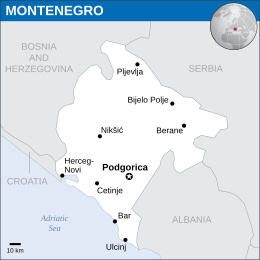More languages
More actions
mNo edit summary Tag: Visual edit |
(→History: Removed section to move it to another page) Tag: Visual edit |
||
| Line 1: | Line 1: | ||
{{Infobox country|name=Montenegro|native_name=Црна Гора|image_flag=Flag of Montenegro.svg|image_coat=Coat of arms of Montenegro.svg|capital=Podgorica|largest_city=Podgorica|mode_of_production=[[Capitalism]]|image_map=Montenegro map.svg|map_width=260|official_languages=Serbo-Croatian|area_km2=13,812|population_estimate=602,445|population_estimate_year=2023}} | {{Infobox country|name=Montenegro|native_name=Црна Гора|image_flag=Flag of Montenegro.svg|image_coat=Coat of arms of Montenegro.svg|capital=Podgorica|largest_city=Podgorica|mode_of_production=[[Capitalism]]|image_map=Montenegro map.svg|map_width=260|official_languages=Serbo-Croatian|area_km2=13,812|population_estimate=602,445|population_estimate_year=2023}} | ||
'''Montenegro''' is a country in the [[Balkans]]. It was part of the [[Socialist Federal Republic of Yugoslavia (1945–1992)|SFR Yugoslavia]] from 1945 to 1992 and remained part of the [[Federal Republic of Yugoslavia ( | '''Montenegro''' is a country in the [[Balkans]]. It was part of the [[Socialist Federal Republic of Yugoslavia (1945–1992)|SFR Yugoslavia]] from 1945 to 1992 and remained part of the [[Federal Republic of Yugoslavia (1992–2003)|FR Yugoslavia]] and later [[Serbia and Montenegro (2003-2006)|Serbia and Montenegro]] until 2006. | ||
== History == | == History == | ||
=== NATO puppetization === | === NATO puppetization === | ||
Revision as of 11:16, 17 March 2024
| Montenegro Црна Гора | |
|---|---|
 | |
| Capital and largest city | Podgorica |
| Official languages | Serbo-Croatian |
| Dominant mode of production | Capitalism |
| Area | |
• Total | 13,812 km² |
| Population | |
• 2023 estimate | 602,445 |
Montenegro is a country in the Balkans. It was part of the SFR Yugoslavia from 1945 to 1992 and remained part of the FR Yugoslavia and later Serbia and Montenegro until 2006.
History
NATO puppetization
In 2007, Ðukanović signed an agreement allowing NATO troops and vehicles to occupy Montenegro. He destroyed the country's Yugoslav-era weapons and ordered replacements from Britain and the USA.
In December 2015, when NATO invited Montenegro to join, thousands protested, and Ðukanović lost support from other parties in his coalition. The government published false polling data that said that a majority of citizens supported joining NATO. On the day of a parliamentary vote in October 2016 to elect the prime minister, the internet was shut down and the opposition news website Vijesti was inaccessible around the world. Ðukanović claimed that Russia plotted a coup against him.[1]
Politics
Current Prime Minister Milojko Spajić seeks to join the EU. His coalition relies on support from the anti-imperialist bloc For a Better Montenegro, whose leader Andrija Mandić agreed to support Spajić's government in exchange for becoming Speaker of the Parliament.[1]


